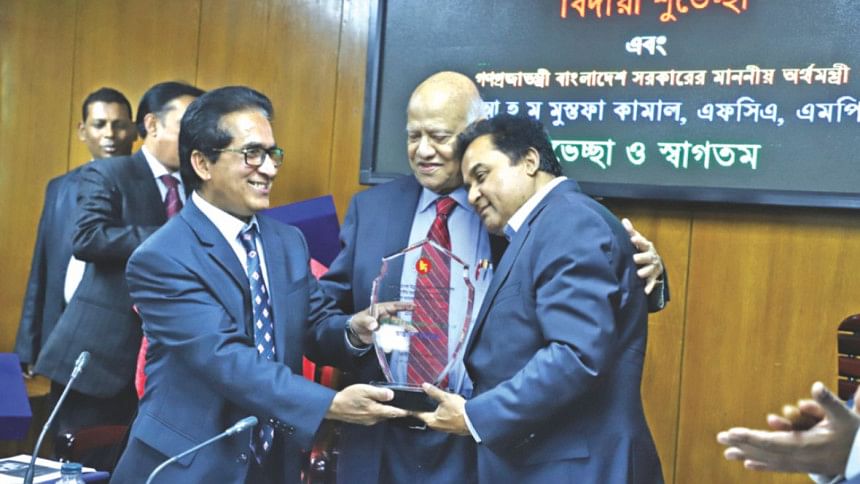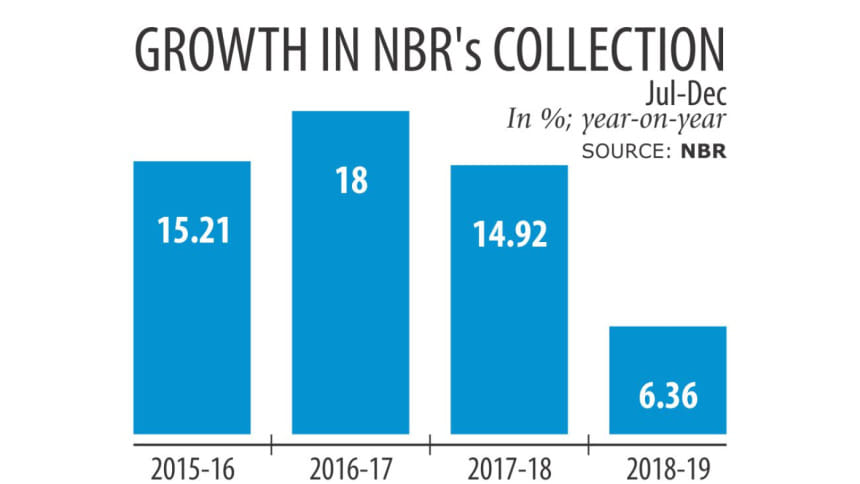Tax receipts slow

Tax collection growth slowed down in the first half of fiscal 2018-19, in what can be viewed as a major setback for the government's efforts to ramp up revenue.
Between the months of July and December last year, Tk 98,027 crore was collected by the National Board of Revenue, missing the target for the period by Tk 28,000 crore.

The receipts are an increase of 6.36 percent from a year earlier, but the growth is the lowest in recent years.
Underwhelming collection from import tariff and value-added tax (VAT) from domestic businesses was the major reason behind the low growth, NBR's provisional data showed.
Collection of VAT, the biggest source of revenue, was Tk 38,452 crore during the period, up 5.26 percent year-on-year.
Customs could log in 3.72 percent higher collections year-on-year, at Tk 30,818 crore.
During the period, income tax collection grew 10.94 percent year-on-year to Tk 28,756 crore.
At a press briefing organised ahead of the International Customs Day tomorrow, NBR Chairman Md Mosharraf Hossain Bhuiyan linked the slowdown in collection to reconciliation of data with the Controller General of Accounts (CGA) office, whose account is taken to be the official figures.
Revenue officials said collection growth reflects poor performance owing to showing inflated revenue figures for the last fiscal year. A senior official seeking to remain unnamed, however, feared leakage in import tariff. "Imports were higher than the collection from customs. It appears that duty was not assessed properly," the official said.
Bhuiyan said the total collection this fiscal year is likely to be in the neighbourhood of Tk 250,000 crore -- which is way short of the target of Tk 296,201 crore.
Earlier in the day, the NBR organised a ceremony to bid farewell to AMA Muhith as finance minister and welcome his successor, AHM Mustafa Kamal.
Massive reforms are needed to take the economy to a higher growth trajectory and attain the goal of turning Bangladesh into a developed country by 2041, Kamal said.
"Some reforms have been done and some good works are going on. But our dream is big, so without reforms, the growth would be arithmetic."
Kamal said reforms in education are needed as it would be impossible to attain the 2041 goal without enhancement of human resources. The existing curriculum is unable to meet the demands for the fourth industrial revolution, he said.
"Our children will have to learn about artificial intelligence, blockchain technology and material science, quantum computing and things like these. We have to pay attention to this." Kamal also lauded Muhith's role in taking the economy to a new height in the last 10 years. "We had only a $72 billion-economy 10 years ago. Today, it is $274 billion," he added. Muhith said Bangladesh's tax-GDP ratio is one of the lowest in the world and the ratio should be raised to increase the state's capacity to finance expenditure.
He once again shared his idea of conducting a survey to find out the number of people with taxable income by enlisting the services of university students.
"Some innovative initiatives are needed to bring about improvement in our character," Muhith said. In response, the NBR chairman said his office plans to conduct a survey with the support of city corporations. "We have started doing a survey to expand the tax net," he added.

 For all latest news, follow The Daily Star's Google News channel.
For all latest news, follow The Daily Star's Google News channel. 



Comments